Trudy J. Morgan-Cole's Blog, page 32
December 14, 2021
In Every Mirror She’s Black, by Lola Akinmade Akerstrom
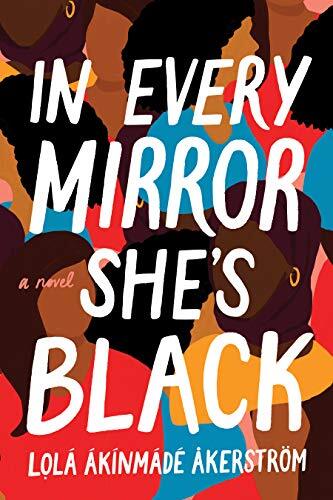
The blurb describes this as a book “for anyone looking for insight into what it means to be a Black woman in the world,” and I guess it is, but it’s also, quite specifically, a book about what it’s like to be a Black woman in Sweden, a very specific niche that the author has lived experience of. The women are Kemi, a successful marketing executive headhunted by a Swedish firm who needs to “diversify” their team; Brittany, who falls in love with Jonny, owner of the firm that hired Kemi, and Muna, a refugee who ends up cleaning the office building that Jonny and Kemi both work in.
The three women are from very different backgrounds and have little in common (and rarely interact during the story); what they do have in common is all being Black women who have come from other places to try to integrate into the extremely white society of Sweden. The other thing they have in common is Jonny, and one of the problems I had with the novel is that to me, this rich white boy who appears to be on the autism spectrum is such an unappealing character (not primarily because of the autism; more because of the rich-guy privilege and there being no sense of anything likeable about him) that some of the plot twists, especially involving his and Brittany’s storyline, strained credibility.
This is a very engaging story, but also an often bleak one that doesn’t hold out a lot of hope for the question of whether there’s a place for Black women to fit in and be successful in Sweden. I won’t spoil any of the women’s endings, but let’s say nobody gets an ending that offers a lot of optimism about the outcome. It does feel like a very realistic portrayal of the racism these women face in ways that are very specific to the country they are in.
December 12, 2021
An Embarrassment of Critch’s, by Mark Critch
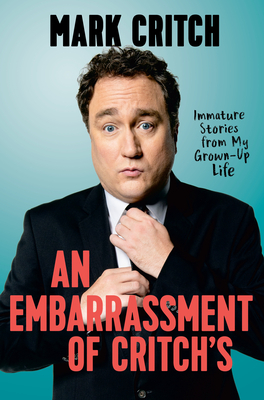
Comedian Mark Critch had a tough act to follow with his debut memoir Son of a Critch, the funniest thing I’ve ever listened to on audiobook and such a hit that it’s currently being made into a TV series. The first book had better material to work with: adulthood is never as funny as childhood, and the two outstanding characters in Son of a Critch were Mark’s parents, vividly brought to life by Mark in the audio version. However, this second book of (as the subtitle tells us) “Immature Stories from my Grown-Up Life” is still very funny and full of insights into what it means to “make it” in the comedy business in this country.
From Critch’s earliest days as a young actor in the Trinity pageant, starring alongside out-of-work fishermen being trained for a new kind of stage, through hair-raising advetures with the troops in Afghanistan, to eventual stardom on This Hour Has 22 Minutes, Mark Critch does a great job of telling us about the highs and lows (but mostly lows, because they’re funnier) of Canadian show business. It might not get made into a TV show (after all, much of it is about a TV show, which might be a bit too meta), but An Embarrassment of Critch’s is a worthy follow-up to Son of a Critch, and as with the first book, you really have to listen to the author performing it to get the full value.
As Bright As Heaven, by Susan Meissner
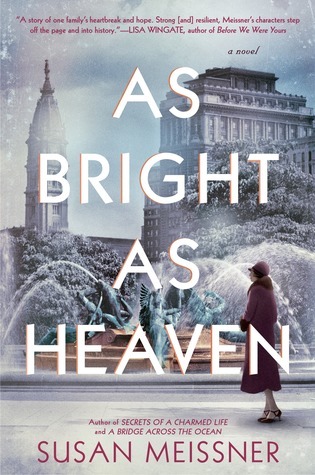
You can’t say that the arrival of global pandemic is good news for anyone, but one small side-benefit might accrue to a writer who decided to publish a novel about the 1918-1919 flu pandemic, timing it to be released around the 100th anniversary of that event in 2018. A writer like Susan Meissner couldn’t have guessed that the events of 2020-2021 would reawaken interest in the whole concept of pandemics, and thus in novels about pandemics, but I’m hoping that amid all the hardship Meissner at least pulled in a few new readers for As Bright As Heaven. Deservedly, because it’s a good story about the flu outbreak in Philadelphia in the fall of 1918.
The Bright family — mother, father, and three daughters — moves to Philadephia in the wake of their own tragedy, to live with their uncle and help in his business, which happens to be a funeral parlour. This gives the family a unique perspective from which to view the devastating plague that quickly sweeps through the city, leaving their lives changed forever. Each of the the daughters — Evelyn, Maggie, and Willa — is coming of age as World War One ends and the pandemic hits, and each struggles with her own difficult choices.
Some of the endings to the sisters’ separate storylines were tied up almost too neatly in the story’s denouement, but in general I found this an engaging, highly readable novel about a historic tragedy that hasn’t featured as largely as one might expect it to in historical fiction.
December 6, 2021
So Many Beginnings, by Bethany C. Morrow

So Many Beginnings is a remix, or re-imagining, of Little Women — a novel about a mother and four sisters set during and immediately after the American Civil War, but focusing on a Black family rather than a white one. The concept is really interesting, especially given that a) Little Women is kind of a foundational text for me, and b) one of my quibbles with it has always been how it sidesteps issues of race and slavery, making the March’s life far more blandly white than that of the actual Alcott family, who hid an enslaved person in their home for awhile when Louisa May was the same age Jo is at the beginning of the novel — why didn’t LMA write that story??!
Bethany Morrow has written the story of four sisters who, with their parents, escape slavery and are living in Freedman’s Colony on Roanoke Island during and immediately after the final years of the civil war. The general outlines of the family are similar to Alcott’s March family — Meg is the responsible older sister, who is a teacher, Josephine is an aspiring writing. Bethany, rather than existing only to die young and beautiful, is a seamstress (she does get sick during the story, but not with the same results as Beth in Little Women), and Amy/Amythest is a dancer. The plot doesn’t slavishly follow that of Little Women; there is a Laurie character, but the progress of his and Jo’s relationship is different (and perhaps more interesting!) than in the original novel. And the challenges the sisters face are, as you would expect, very much intertwined with the challenges free Black people faced in those years. I learned a lot I didn’t know from this novel, particularly about the Freedman’s Colony, which I had not heard of before. It was informative and interesting to read about the racism and paternalism faced by freed Black people from the perspective of a family like the Marches in this novel.
One small quibble I had with this book is that I felt it ended too soon! Not so much that it needed to be longer, but that I thought the most interesting conflict in the whole book came late and wasn’t fully developed. Jo’s aspirations as a writer in this novel are similar to the original Jo March’s ambitions in Little Women, and like the original Jo she faces many roadblocks along the way, including editors who want to turn her stories into something that doesn’t feel true or honest to her. In So Many Beginnings, Jo writes a memoir about her family’s experiences under slavery — but the people who want to publish it, both patronizing white folks and free-born Northen Black people, feel that her story would be more powerful and reach a wider audience if Jo, who is very well-educated within the scope available to her, and quite well-read, would rewrite her story in “slave dialect,” so that she speaks in the voice white Americans are used to hearing from southern Blacks.
If you’ve read the original account of Sojourner Truth’s “Aint I a woman?” speech, you know how prevalent this kind of thing was in 19th century American — recasting the voices of Black people to make them fit the expected stereotype of the poor, uneducated Black person who speaks in a heavy dialect. I thought the choice Jo faced — rewrite her true story to make the voice less true, but get the story to a wider audience — was the most interesting conflict in all of So Many Beginnings, and I was disappointed it wasn’t given more narrative space, as I really wanted to read about that! But despite that quibble, this was a really interesting way of recasting and reimagning a familiar story.
December 2, 2021
Matrix, by Lauren Groff
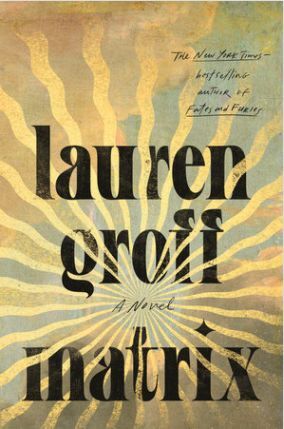
This award-winning historical novel blends the stories of two little-known historical women who may have been the same person: 12th century poet Marie de France, and 12th century abbess (and half-sister of Henry II), Mary of Shaftesbury. Some scholars have suggested they were the same person, but since not much is known about either woman’s life, nobody can be sure. Lauren Groff blends the little that is known about both women’s lives, with what we do know about nuns, women poets, and royal bastards in 12th century France and England. Then she adds the touch of imagination that brings a character to life as a real person capable of love, lust, hate, ambition, jealousy and devotion.
The Marie of this novel has all that and more. Unwillingly sent to a convent as a young girl, she is at first resentful, but soon learns to seize on the rare opportunities medieval convents offered women: the chance to exercise leadership, creativity, and administrative skills that many married women, even in the upper classes, did not have the freedom to explore. Marie is a powerful and unforgettable character. I knew nothing about either of the historical women behind this novel when I picked it up; I’ve read complaints but people who are very interested in Marie de France that her poetry is given short shrfit in this novel, and I can sort of see that. The novel is not really about Marie as a poet, but as a woman and, particularly I would say, a woman learning to exercise power in the ways that her world allows her to. I found it engrossing and read it quickly.
December 1, 2021
Other People’s Things, by Kerry Anne King
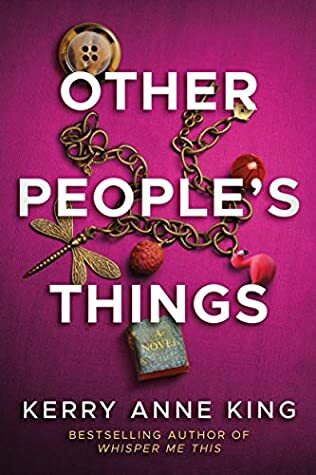
Once again, Kerry Anne King has produced a deceptively light novel that delves into dark places, a novel that weaves together psychological realism with a touch of the more magical kind of realism to produce a story and characters I found both engaging and moving.
Nicole is a kleptomaniac. She’s an embarrassment to her family and a disgrace to her respectable lawyer husband. She can’t figure out how to stop relocating other people’s belongings–mostly because she feels them calling out to her. Whether in someone else’s home or in a store, all her life Nicole has had a sense that certain objects are in the wrong place, and it’s her job to move them to where they need to be. Needless to say, the law doesn’t see eye-to-eye with her on that.
This is where the lightly magic-realism element of the novel comes in, because the belief that objects need to be “relocated” could just be a symptom of mental illness on Nicole’s part — but the story encourages us to believe that maybe, just maybe, there’s actually something to it. That some of her “relocations” work out in ways that are more than just coincidence. And that the problem that has plagued Nicole’s whole life could actually be turned to positive uses.
Along the way to helping Nicole discover that she’s more than just an epic screw-up with a criminal record are a vividly drawn cast of characters, a delectable love interest, a community of friends and found family who believe in Nicole — and a delightfully awful antagonist that you can really love to hate. I raced through this book quickly and found it hard to put down.
November 30, 2021
Love, Life, by Bernardine Ann Teraz Stapleton

Love, Life is a hard book to categorize, in the best possible way. It’s a memoir, and it’s fiction. It’s a little bit fantasy. It’s a little bit poetry. It’s written by a novelist who made her mark on the world first as a playwright, and there are scenes you can easily imagine on stage. It’s eerie, haunting, beautiful, and hard to pin down.
If you know Bernardine Stapleton at all in real life (which I am privileged to do, a little bit) you might know that in the those rosy pre-pandemic days of world travel, she and a friend went on a yoga retreat to Italy. .I know this happened; I saw her Facebook pictures as she posted them. So I might have expected a memoir — since this is book is told by a first-person narrator who has gone on a yoga retreat to Italy in midlife. It’s that, but it isn’t, and it’s also much more. It’s rich, and strange, and fantastic in both senses of the word. That’s as close as I can come to explaining this book. I read it in two sittings (it’s short), sitting outside in the sunshine on a perfect day in an idyllic place (not, alas, Italy, but still pretty idyllic) and that’s the way to read it, out in the sunlight, because even though it has moments of darkness, this little book is drenched with light.
October 26, 2021
Call Me Indian, by Fred Sasakamoose
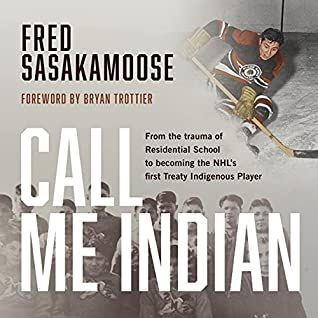
Call Me Indian (a book in which, very near the beginning, the writer explains why he calls himself “Indian,” why some First Nations people like to use that term and others don’t, and why white people shouldn’t use it) is the life story of Fred Sasakamoose, a Cree survivor of residential schools who was one of the first Indigenous players in the NHL. Though Saskamoose’s NHL career was short, his hockey career in the minor leagues and at many levels of the game was long, and his story is an interesting one. He died of Covid-19 in his 80s last year, and I’m glad he had a chance to tell his story while he could.
There are obvious echoes here of the novel Indian Horse, which is a favourite of mine — Sasakamoose did not know anything about Wagamese’s novel before it came out, but it turned out that his brother knew Richard Wagamese and that the author had been inspired by hearing about Sasakamoose’s career. While the story of Saul Indian Horse is not the same as the story of Fred Saskamoose, it’s easy to see the parallels, the ways in which the real-life Indigenous hockey player inspired the fictional one — as well as the ways in which a fiction writer would make changes to the true story to heighten plot and theme. This makes the two books interesting to read side by side, as a study in the differences between fiction and memoir — but also as two different ways of learning about what happened to some of the First Nations men who played our “national game.”
October 25, 2021
When the Dead Are Razed, by Samuel Martin

When the Dead Are Razed is a dark, action-packed thriller with an insightful eye for its characters, even when they are making terrible decisions. The main character is Teffy Byrne, a young Newfoundland journalist working for an independent newspaper. Teffy lives with her boyfriend Ger, a former drug dealer who is trying to reshape his path in life. But when Ger’s former boss gets out of jail, the past reaches out to both Teffy and Ger. Believing Ger’s life to be in danger, Teffy is soon off on the a road trip that veers from grim desperation to (very) dark humour. Her spur-of-the-moment decision to swap out a bag of smuggled heroin for the contents of a dead woman’s urn leads to a tangle of confusion, suspense, and violence.
The pace of this book was relentless, and sometimes I found myself scrambling to keep up. A lot of things happen to a lot of people, and I occasionally got lost in the action scenes – which likely says more about me as a reader than it does about Martin as a writer. This novel deals with some bleak sides of human nature, but it’s Martin’s compassion for his characters, even in their darkest moments, that forms the bright thread running through the story.
October 24, 2021
The Man Who Died Twice, by Richard Osman
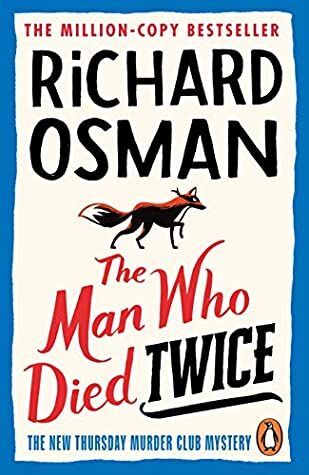
The Man Who Died Twice picks up where The Thursday Murder Club leaves off, with a second mystery. Retirement home residents Elizabeth, Joyce, Ron and Ibrahim, hot off solving a real-life murder case, are presented with another tangly problem. Elizabeth, a retired spy, is contacted out of the blue by a man she not only knows to be dead, but one who never actually existed — a name and fake identity that she remembers from her years in intelligence work. Then Ibrahim, overcoming some of his fears to step out on his own, is brutally attacked and severely injured. These two storylines weave together in surprising and rewarding ways.
As an exercise in character and setting, I found this an enjoyable continuation to the saga, further exploring the lives of our four main characters plus local police officers Chris and Donna. As a mystery novel, I found this one more tightly plotted and the solution more satisfying than the last book. I hope there are more to come.



